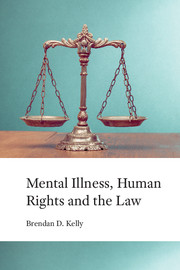Book contents
- Frontmatter
- Contents
- Foreword
- Preface
- Acknowledgements
- List of boxes
- List of legislation, treaties and conventions
- List of cases
- 1 Human rights and mental illness
- 2 Mental Health Acts 1983 and 2007: England and Wales
- 3 Fusing mental health and capacity legislation: Northern Ireland
- 4 Mental Health Act 2001: Ireland
- 5 The challenges of reform: Scotland
- 6 Structural violence, power and mental illness
- 7 Conclusions: fighting for rights
- Notes
- References
- Index
4 - Mental Health Act 2001: Ireland
Published online by Cambridge University Press: 01 January 2018
- Frontmatter
- Contents
- Foreword
- Preface
- Acknowledgements
- List of boxes
- List of legislation, treaties and conventions
- List of cases
- 1 Human rights and mental illness
- 2 Mental Health Acts 1983 and 2007: England and Wales
- 3 Fusing mental health and capacity legislation: Northern Ireland
- 4 Mental Health Act 2001: Ireland
- 5 The challenges of reform: Scotland
- 6 Structural violence, power and mental illness
- 7 Conclusions: fighting for rights
- Notes
- References
- Index
Summary
In Ireland, there was scant provision for people with mental illnesses throughout the 17th and 18th centuries (Psychiatrist, 1944; Robins, 1986; Kelly, 2004b). The 19th century was, however, a time of intensive legislative activity, resulting in the establishment of a large network of public asylums (Hallaran, 1810; Finnane, 1981): in 1851 there were 3234 individuals in Irish asylums and by 1891 this number had increased to 11 265 (Inspectors of Lunatics, 1893). This trend continued well into the 20th century: by 1961, 1 in every 70 Irish people above the age of 24 was resident in a psychiatric hospital (Lyons, 1985). Although there were similar problems with high committal rates in other countries, including France, England and the USA (US Bureau of the Census, 1975; Shorter, 1997), Ireland's admission rates were especially high at their peak and especially slow to decline (Kelly, 2008b).
Against this background, Ireland introduced a significant reform of mental health legislation in the form of the Mental Treatment Act 1945. This Act was to remain the cornerstone of Irish mental health law until the Mental Health Act 2001 was fully implemented in November 2006. This chapter examines key issues in Irish mental health law and human rights prior to the Mental Health Act 2001. It then outlines provisions of the 2001 Act, explores human rights implications of the Act and summarises the report of the Expert Group on the Review of the Mental Health Act 2001 (2015). It concludes with an overall assessment of mental health law and human rights in Ireland today.
Irish mental health law prior to the Mental Health Act 2001
Ireland's Mental Treatment Act 1945 brought about several important reforms in mental health services. These included, most notably, the introduction of a voluntary admission status (section 1), a reform that had already been implemented in Great Britain (1930) and Northern Ireland (1932) (O'Neill, 2005; Kelly, 2008c). Ireland's 1945 Act also introduced two new procedures for involuntary admission, one for ‘persons of unsound mind’ and the other for ‘temporary chargeable patients’. Both procedures required that a family member, relative or other person make an ‘application’ for involuntary admission (section 14(1)) and that an ‘authorised medical officer’ (e.g. general practitioner) examine the individual, who was then transported to a psychiatric hospital (by the police, if necessary), where a detention order could be completed by a doctor, following psychiatric examination.
- Type
- Chapter
- Information
- Mental Illness, Human Rights and the Law , pp. 104 - 131Publisher: Royal College of PsychiatristsPrint publication year: 2016



